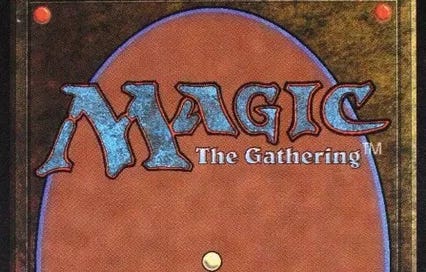Look — Magic: The Gathering1 is First Ballot. No debate.
Magic is to Gaming what Star Wars was to movies. A “where did that come from?” phenomenon that shaped the industry (and related industries!) for decades to come. I started playing because everyone else was playing. Going to the gaming club without a magic deck was like going to a poker room with no bankroll. Sure, you were there … but what were you doing there? I literally did not understand over half of the conversations I was overhearing until I bought some cards.
A few years later I was talking to a friend of mine who owned a game store and magic was ~40% of his store. But there were plenty of pop-up e-commerce stores and mall kiosks where it was basically 100%. Did Magic double the number of people who stopped by the game store?
Arguing where Richard Garfield’s creation sits in the pantheon of the 20th Century Games is like arguing where the Beatles exist in 20th century music. You want to claim #1? Yup. You say they aren’t The Best, but close? Reasonable. Outside of the Top 10? Hot take! But I’ll listen.
But if you want to discount them entirely … You. Are. A. Crank.
Magic, a card game inspired by Cosmic Encounter2, shows no sign of slowing down a 3rd of a century after first publication. Even in the first edition (“Alpha”) which only had three hundred-ish cards, the FAQ quickly ballooned to hundreds of pages. Magic questions and answers were posted on USENET (and — soon after — the web). It wasn’t just dominating gaming culture, it was dominating geek culture and then popular culture.
When I hear that Magic had printed 2 Billion cards in four years, I think “That few?”3
But — to get back to the Beatles — the interesting thing about “Best of the Century Lists” aren’t necessarily arguing on the Top Spots. The Beatles are there, yes. But how many hundreds of Collectable Card Games (CCGs) did Magic spawn?4 Sure, many were horrible ripoffs and cash grabs … I played my fair chunk of them.5 But there were also worthy games in their own right; games that provided hundreds or thousands of hours to entertainment to a dedicated fanbase, such as:
Richard Garfield’s own Netrunner, which had a cat-and-mouse bluffing tension quite unlike Magic and arguably only died because the publisher was looking for another block-buster like Star Wars and not content with a cult-classic Blade Runner.
Legend of the Five Rings, which incorporated tournament results into in ongoing storyline and saw players self-organize into their favorite clans, just like the feudal Japanese world it portrayed.
Pokemon made a game accessible by young children (and is still played at my local game store by kids and adults).
My kids never played Pokemon, but they liked buying and looking at the cards. My son still plays Magic. I don’t know what the current retail situation looks like, but if you told me that local game stores still made 30-40% of their money from Magic … I’d believe it. For some Magic is a gateway drug that some people never move past; others eventually get curious and explore more of the games that are discussed here.
A funny thing happened at my game club, after Magic showed up. We started playing games that were much more complex and longer. In fact, one of the biggest beneficiaries of Magic’s appearance was the game …. Titan, a game that I had personally sworn off as “too long and too tedious” to play after my initial exposure.6
Titan was revived partially because it shared a theme (“Recruit Monsters and Bash your Enemies”) but partially because Titan’s main flaw (as a 4+ player game) was that when two players fought, the rest had nothing to do. But with Magic, that wasn’t a problem. Downtime? Play a side game of Magic.
Waiting for the rest of your 18xx game crew to show up? Game of Magic! Magic sucked the air out of the gaming industry for a few years, but then — when gamers started to inhale again — was it responsible for the massive growth?
Those are interesting things to debate.
But whether it’s on the list? Not open to debate. First Ballot.
But I will not be typing the full name ever again.
Rookie numbers …. by the 25th anniversary they were doing roughly 2 Billion cards per year.
Looking at the list on Wikipedia, I counted thirty CCGs …. that began with the letter ‘A’.
I will even admit to having bought Hyborean Gates.
A fact that I simply must mention — that game store owner I mentioned earlier in the article? He failed out of college partially due to …. a game of Titan!




